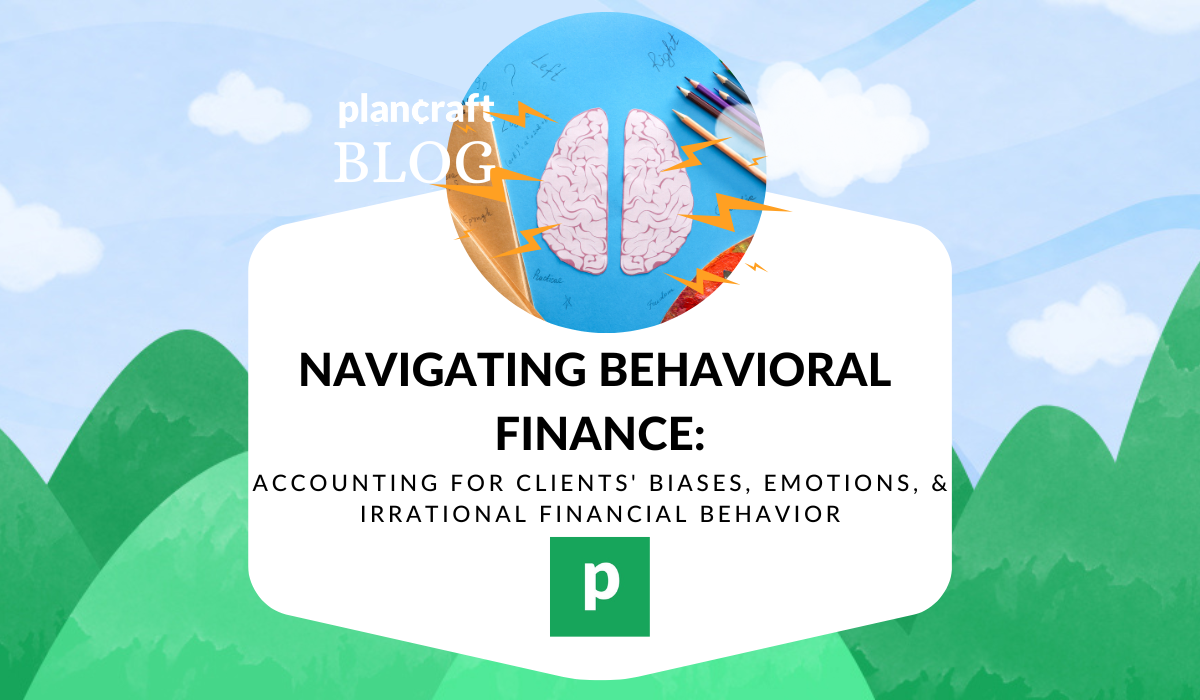Human beings, it turns out, are irrational creatures — we almost always know what we should do (ride the Peloton and eat a salad), and yet so often we make exactly the opposite choice (watch TV and eat a whole pizza).
While this inherent penchant for sometimes-quirky irrationality certainly generates a plethora of mildly amusing videos of people hurting themselves in stupid ways, when it comes to managing money intelligently, it gets truly painful.
Handling financial decisions emotionally tends to have the same effect on an investment portfolio as tossing an ice cube into a bonfire. Which, of course, is where financial advisors come in.
Your job is to strap your clients to the mast as you guide the ship of their investments through the siren-laden waters of the day-to-day financial market, lest they jump ship at the first sign of danger and end up losing money.
To support you in this most noble and treacherous of quests, we've got a complete breakdown of some of the most common behavioral finance theories that impact human behavior when making financial decisions.
By understanding why a client may want to make financial choices akin to swatting a bug nest with a kayak paddle, you'll be better prepared to convince them not to.
Psychologists have studied and named all sorts of nuanced human behavioral patterns that lead to behavioral finance biases. Here's a breakdown of some of the most common and impactful ones when it comes to affecting people's relationship with financial markets.
Prospect theory and loss aversion
What is prospect theory and loss aversion?
Imagine you are on a game show.
"Here's $500," the host says, handing you a stack of bills. "Now, you have a choice: you can either keep that $500, or take one of these two envelopes, one of which has $1,000 in it, and the other of which has nothing at all."
In terms of the actual value of the choices, they're the same. On average, you get $500 regardless of what you choose. However, humans' tendency towards loss aversion means that most people, most of the time, will take the certain outcome of getting $500.
This is the premise of prospect theory, a.k.a. loss aversion theory: emotionally, people are more impacted by losses than gains. Losing the $500 would hurt so much more than getting an extra $500 would feel good, so people tend to make the choice that seems like they're less likely to lose, even if statistically there is no difference between the choices.
This is why casinos are able to make money: when down at the blackjack table, it borders on impossible, emotionally, to accept the fact that you're about to walk away having lost $250 when you could buy $50 in chips and potentially win it all back (even though, statistically, this is unlikely to happen).
Helping to overcome loss aversion in behavioral finance
When it comes to managing investments in the stock market, prospect theory means that investors tend to accept risk when it means mitigating or erasing a loss, and eschew it when it could potentially lose them money they've already gained, regardless of any probability of any of those outcomes.
As a financial advisor, knowing these behavioral tendencies means you can adjust the way you present options to account for this cognitive bias.
For example, if a client is averse to investing more in the stock market due to its current volatility, focusing on historical return on investment in the long term for well-diversified portfolios might help to mitigate the psychological influences that are preventing your client from wanting to invest, even though statistically hanging on to cash is just about the worst thing you can do with your money.
Mental accounting
What is mental accounting?
Simply put, mental accounting (a.k.a. psychological accounting) is the human tendency to allow personal biases to impact the way we perceive the value of money. So, we allow ourselves to spend $50 we received as a gift more carelessly than any other $50 we earn as part of our regular income; we justify spending $10 on a beer because it was served at the airport, when the same beer costs $6 anywhere else; we'll give out our email address and phone number in order to save $10 on a $30 purchase, but not to save the exact same amount on a $250 purchase.
Basically, this behavioral finance theory acknowledges the fact that our perceptions of the context in which money is earned or spent influences our financial decisions in ways that do not make logical sense.
How to improve investment decisions by mitigating mental accounting
Many investors may succumb to this behavioral finance pitfall and, as a result, misallocate their resources. They may be averse to investing money from a windfall because they feel like they "deserve" to spend it on something nice for themselves, or they may be reluctant to take the hint from financial markets' past investment performance and divest from a particular pet stock because it was their first, or they received the shares from their grandfather, or any number of other illogical reasons.
As an advisor, you can help mitigate psychological accounting by reminding clients that no single dollar (or collection of 100 dollars) is unique. Money is fungible, and ascribing different rules to different pots of money makes absolutely no fiscal sense.
It may help to promote goal-based planning (if you don't already do this), as being able to point out that, for example, hanging on to grandpappy's Bed Bath and Beyond stock isn't going to do anything to help them meet the goal of financing a child's education, or retiring by 55, etc.
Confirmation bias
What is confirmation bias?
Confirmation bias affects far more than financial decisions, however it is one of the most powerful psychological influences on behavioral economics out there.
Essentially, we're talking about the tendency for people to seek and see only evidence that reinforces their currently held beliefs. As such, this psychological fallacy is at the heart of basically every dogmatic preference war in contemporary culture: whether you're an Apple or an Android person, regardless of which political party you support, whether you prefer Hydrox or Oreo cookies, it's all the same.
Our brains seek out, focus on, and more easily recall evidence that supports currently-held beliefs compared to evidence that denounces those beliefs. Both Apple and Android devices have a plethora of positive and negative reviews, but if you've owned an iPhone for the last 15 years, you've likely "seen" many more positive reviews of iPhones and many more negative reviews of Android phones in that time.
You may even have tried an Android phone at one point. If so, you likely remember all the experiences you had with that phone that infuriated you, and not so many that were pleasant.
Defeating confirmation bias in investment decisions
The best way to help clients get over this particular bias is to present them with information that contradicts their beliefs.
If, for example, a client wants to hold on to a stock that has historically performed well but is unlikely to recover from its current slump, and they cite the historical data as evidence that it's worth hanging on to, you might show them the evidence you're seeing that tells you exactly the opposite.
You also might encourage clients to provide additional sources of evidence to justify investment decisions that you're fairly certain won't bear out well in the stock market.
Herd behavior
Understanding Herd Behavior in behavioral finance
When wolves stalk a herd of buffalo, their whole hunting strategy relies on the consistency of this type of behavior: if they can get one buffalo to panic, they know the whole herd will panic too, and a stampede that allows the wolves to single out a target begins.
Luckily, the stock market is not a pack of sentient hunters out for our blood, or we'd all be in trouble. The same principles, however, apply to behavioral finance biases and financial decision making.
There are two main scenarios in which investors tend to behave in a similar manner to a herd of panicked bovines:
The first is when trendy stocks start increasing in value quickly. Remember in 2021 when Gamestop's stock skyrocketed seemingly overnight? How many people jumped to buy into the hype, only to find that (thanks to the efficient market hypothesis) they were already too late?
FOMO (fear of missing out) is a powerful force in behavioral economics, and anytime people get the sense that a particular stock might be in the process of spiking, they're going to want very badly to invest so they don't miss out on potential windfall investment gains.
The other scenario is, of course, exactly the opposite: when stock market prices dip severely, investors sell their shares before they lose too much money. When everyone does this at once, of course, markets crash and we end up with a financial crisis on our hands. But nobody wants to be the schmuck who left their money in a market that is now completely worthless.
Advising against behaving like a herd
The best thing you can do to combat clients' tendency to behave like a panicked bovine when exercising financial decision making is to advocate for self control; remind them they should listen to the financial professionals, and thereby avoid making irrational financial decisions out of fear.
You can actually lean on other behavioral finance theory here: because of inherent risk-aversion, reminding a client that to pull money out of the market when it's at a low point is to accept loss, whereas remaining invested offers the (rather more likely) opportunity to recoup losses over time.
On the other hand, if you have clients ready to jump off the bridge of trendy investing decisions based on sudden market gains because they saw all their friends doing it, showing them what's underneath the proverbial bridge is probably a good idea.
Explain the efficient market hypothesis and show them examples of what happens to folks who jump on bandwagons that are well on their way to riding out of town.
That should be enough to help them cultivate enough self control to avoid buying into a company when its stock prices are as high as they're ever likely to go.
Behavioral Finance TLDR
Unfortunately, because they are fallible humans, your financial planning clients are going to fall prey to the fallacies of behavioral finance, and, unless you stop them from making these cognitive errors, it's going to harm them in the long term.
Here are four of the most common behavioral finance concepts that interfere with sound investment decisions and how you can help your clients avoid them:
-
Prospect theory and loss aversion
People are inherently more motivated by potential losses than they are by potential gains. So, in the investing world, a client may be reluctant to buy into a struggling market, even though that's technically the best time to invest.
Data may be the best solution to this behavioral finance fallacy. People are motivated by certainty, and if you can demonstrate strong likelihood of gains over time, it may override a client's fear of losing in the short term. -
Mental accounting
People attach emotions to their money in ways that make no actual fiscal sense. The first $100 you ever made is exactly the same as the next, and that $20 you found on the street is no different from the $20 you got as a tip at work, nor is it at all special compared to any other $20 you earned on the job.
And yet, we allow our emotions to create special rules for our spending habits when it comes to particular "accounts" of money we designate in our heads.
Goal based planning is a nice way to alleviate this particular behavioral finance fallacy, in that it allows you to remind clients that a particular "rule" they invented doesn't actually help them meet their financial goals. -
Confirmation bias
You might call this the echo chamber effect: we notice and recall information and experiences that reinforce our current beliefs, therefore confirming our bias. Even if there is just as much (or even more) evidence to support contrasting beliefs, that which stands out is that which makes us feel like we're right.
When it comes to investing, this could be particularly dangerous, as it could make investors' flawed thinking seem like rational decisions.
To combat this, advisors can present information from varied perspectives that challenges these strongly held beliefs. -
Herd behavior
Humans are animals after all, and sometimes we act like them. Our tendency to want to follow the herd when it comes to investment decision making can be problematic, however. Jumping on the bandwagon of meme stocks as they rise in value and jumping off the bandwagon when prices fall are both irrational financial decisions that most financial analysts would advise against.
And yet, the urge to follow the group is strong.
Financial advisors must encourage their clients to exercise self control in the face of this urge. Using the behavioral finance concept of risk aversion is a great way to encourage this in the case of wanting to get out of a slumping market: divesting is admitting defeat and accepting a loss, whereas remaining invested offers the opportunity for gain.
Behavioral Finance FAQs
What is an example of behavioral finance?
Behavioral finance is area of study that investigates how psychological influences dictate financial decision making, usually for the worse. There are many observed psychological biases that fall under the category of behavioral finance, some of the most common of which are prospect theory, mental accounting, confirmation bias, and herd behavior.
What is the main concept of behavioral finance?
There is no one "main concept" in behavioral finance. Instead, the field examines all sorts of ways that cognitive biases, like prospect theory, mental accounting, confirmation bias, and herd behavior, impact financial decisions.
If there were a main thesis of behavioral finance, it would be that irrational human emotional tendencies often influence our behavior when making financial decisions that should be made objectively.
How is behavioral finance different from modern finance theory?
Whereas behavioral finance examines and attempts to correct the impact of irrational cognitive biases on financial decision making, modern finance theory (or modern portfolio theory) assumes exactly the opposite: that all decisions about investing are made with rational intent and the market adjusts instantly to any new information that's available, and therefore there's no way you can "game" the market.
Is behavioral finance normal?
Is it normal to let your personal biases affect the decisions you make with regard to how you invest your money? Yes. Almost everybody does it. That's why professional financial practitioners are so valuable: they can help mitigate the most common cognitive biases and help transform even the most clueless client into a savvy investor.








.png)
